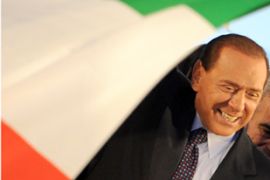Regional polls favour Berlusconi
PM’s coalition wins Italian local polls but poor turnout denies him strong victory.

The 73-year-old premier, two years into a third term ending in 2013, campaigned actively to avoid the low turnout that was seen in this month’s French regional elections, which proved damaging for Nicolas Sarkozy, the French president.
Low turnout
Voter turnout stood at 65 per cent – which would be a good result in other European countries but in Italy it was a record low – seven per cent lower than in the last Italian regional elections in 2005.
The high level of abstention suggested disaffection with politics in general, according to analysts who cited candidates’ failure to address issues of most concern such as unemployment and the economic crisis, as well as a recent corruption scandal involving a top Berlusconi aide.
Compared with the 2008 national election results, Berlusconi’s People of Freedom (PDL) party lost 6.3 percentage points, taking 26.7 per cent of the vote, while the main opposition party, PD, lost 8 percentage points at 26 per cent.
With two key regions still too close to call late on Monday, Berlusconi’s Northern League allies appeared to be the only clear winners in the election – and increasingly looked more like rivals than partners in the ruling coalition.
All eyes were on Lazio, where bureaucratic bungling by the PDL excluded its list of candidates for Rome, and Berlusconi’s candidate Renata Polverini was neck-and-neck with centre-left former European Commissioner Emma Bonino.
Projections and partial results from the vote in 13 out of Italy’s 20 regions had Berlusconi winning four, the centre-left holding on to power in seven and tying with the right in Lazio – which includes Rome – and Piedmont.
Going into the vote, Berlusconi’s coalition controlled two and the opposition, 11 of the 13 regions up for grabs.
Northern League gains
The Northern League won Veneto as expected, becoming the region’s biggest party, but also edged ahead of the centre-left in Piedmont and closed the gap with Berlusconi’s PDL in Lombardy.
If the latest projections are confirmed, it would run two regions in the rich north for the first time in its history.
Berlusconi has dismissed talk of internal rivalry with the anti-immigrant, pro-autonomy Northern League, which already has key cabinet posts and could now seek more power within the ruling coalition.
After a turbulent 2009 for Berlusconi marked by a divorce, prostitution scandals and legal battles to keep him out of court on corruption charges, he is now being investigated for allegedly trying to shut down TV talk shows critical of him.
Berlusconi had hoped the polls would yield a resounding vote of confidence for his government and give him momentum for controversial reforms, including an overhaul of the judiciary.
With his popularity slipping in opinion polls, he may also be tempted to spend his way back to favour.
But Giulio Tremonti, the economy minister, who enjoys the support of the Northern League, whose gains could underpin his role as guardian of a strict line on spending that has stopped Italy’s fiscal position deteriorating as badly as its neighbours.